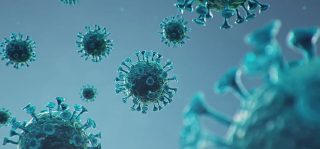According to a recent study published by JAMA ( Journal of the American Medical Association), 87% of patients who recovered from COVID-19 had at least one persistent symptom and almost half 44% of patients reported a lower quality of life following recovery from COVID-19 with persistent symptoms more than 2 months. In another report, young people aged 18-34 years with no chronic illnesses had 20% of them had not returned to their usual state of health, even patients with mild cases described as shortness of breath, persistent fatigue, The JAMA study refers to a medium follow up of 60.3 days after the onset COVID-19 symptoms, only 12.6 % of patients were completely free of any COVID-related symptoms, 32% had 1-2 symptoms, 55% had 3 or more symptoms. The most frequently reported symptom is fatigue in 53.1%, shortness of breath 43.4%, joint pain 27.3%, chest pain 21.7%.
Other long-term damage from COVID-19 will include lung scarring, decreased lung functions, decreased exercise capacity among those patients who were previously intubated, and spent a long time on full ventilator support. Added stress on the body by COVID-19 can increase the release of adrenaline and norepinephrine which have adverse effects on the heart. There is about 20-30% of hospitalized patients with COVID-19 have elevated Troponin levels which is a specific enzyme that indicates acute heart muscle damage leading to cardiac arrhythmias. This is why close monitoring and follow up for persistent clinical symptoms and its appropriate treatment to get the patient back into an improved quality of life without lingering COVID-19 symptoms.
Obesity does matter as an independent risk factor for acquiring COVID-19 infection, requiring full mechanical ventilatory support regardless of the age. Obesity affects about 40% of the U.S population and can lead to prolonged viral shedding which causes the easy spread of the virus. Thus, turning into chronic cases for many months after being tested negative. They would have persistent symptoms of headaches, difficulty sleeping, anxiety, dizziness, cough, memory loss, heart palpitations, muscle and joint pain, hair loss, and diarrhea. There has been reported now the second round of infections with COVID-19 after tested negative earlier
Some medical centers have adopted blood thinner therapy for one month after hospital discharge. Autopsies showed clots in the lungs, heart, liver, and kidneys. Blood tests were done at the Emergency room such as ( D-Dimer) which is a fibrin degradation product indicated blood clots at the time of admission. Blood thinners have thus been added to treatment protocols of COVID-19 with full dose even if they do not have documented blood clots. Blood thinners could be given by either I.V. route ( unfractionated heparin ) or subcutaneously administered twice a day. Some high volume hospitals adopted giving patients oral blood thinners because of the logistics of nursing.
What will always be an integral part of COVID-19 care is to strengthen the immune system to fight multiple infections simultaneously. ( regular flu is overlapping with COVID-19 and other infections this fall and winter, prevent re-infection and minimize long term post-COVID-19 symptoms.
- Dr. Adel Eldin, MD, FACC, FACP, MBA, GGA
- Board Certified Cardiologist
- Founder, CEO
- Affordable Quality Healthcare Program
- www.prontocare.co
- Founder, CEO
- www.floridamedicaltourism.com
- Wesley Chapel, Florida
- Tel: 877-DR ELDIN









